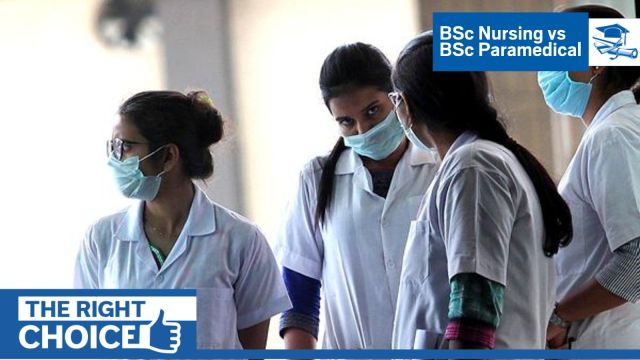© IE Online Media Services Pvt Ltd
Latest Comment
Post Comment
Read Comments
 BSc Nursing vs BSc Paramedical:Both fields are essential pillars of modern medicine. The choice should be determined by a student's interests, career aspirations, and what kind of working environment the student want to be in (Express Photo by Bhupendra Rana/ representative)
BSc Nursing vs BSc Paramedical:Both fields are essential pillars of modern medicine. The choice should be determined by a student's interests, career aspirations, and what kind of working environment the student want to be in (Express Photo by Bhupendra Rana/ representative)(‘The Right Choice’ is a series by The Indian Express that addresses common questions, misconceptions, and doubts surrounding undergraduate admissions. You can read the stories here.)
— Uma Bhardwaj
Choosing one’s undergraduate course is a difficult task, especially when the course deals with careers that directly affect human lives. BSc Nursing and BSc Paramedical are two of the most demanding health courses in India, attracting students to an extremely respectable and in-demand profession. Just like all other courses receptive to the medical science field, both are inherently different from one another in terms of professional assumptions, skills, and employment opportunities. The global demand for health professionals remains strong. It is important to know the differences between these two courses and which one is of interest.
Understanding the core difference
Coming from a British BSc Nursing, it is a four-year undergraduate program majoring in the area of patient care. The curricula build skills necessary for registered nurses who will cater to hospital duties, assist in surgeries, and provide long-term care to patients. Theoretical instruction is combined with field practice, preparing graduates for roles in hospitals, but also in community health settings, nursing homes, and international healthcare organisations.
BSc Paramedical, on the other hand, refers to some specialised paramedical degree courses, which include those training in conscious shaping but are technically inclined and diagnostic roles; direct patient care is absent.
This course usually runs from 3 to 4 years depending on the specialisation that can include Medical Laboratory Technology, Radiology and Imaging, Anesthesia Technology, Operation Theatre Technology, and Dialysis Technology; thus, the fundamentals in training are to equip professionals to assist medical teams through diagnostic tests, surgical helps as well as life-saving emergency services in providing such service.
Qualifications and curriculum
Usually, both BSc Nursing and BSc Paramedical courses typically require students to have the same physics, chemistry, and biology background of 10+2. Many Paramedical courses accept a student with only PCM along with the Paramedical course, but usually only in fields such as radiology or medical imaging.
Nursing students complete the same rigorous subject matter during their BSc programs in anatomy, physiology, and pharmacology, and then go through each of their rotations.
Paramedical students will be exposed to the same subjects, but mainly when we are only learning how to work the equipment and lab tests, and to provide support to a surgeon or a physician during a procedure. Both programs require students to have an academic education and practical hands-on experiences, but the environments of both programs can be different.
Career options and work settings
Nursing graduates of BSc Nursing frequently start positions as a Staff Nurse, ICU Nurse, Nurse Educator, or Community Health Worker. They can work in government/ private hospitals, armed forces, NGOs, or even in international settings, such as those available to Indian Nurses who are in high demand. Nurses typically work a combination of shifts and hours, including weekends and nights, and must demonstrate a concern for human kindness and compassion, which is demonstrated through being patient-centred.
Graduates of BSc Paramedical often work in the background but are equally important. Some positions include Lab Technician, Radiographer, OT Technician, and Dialysis Technologist. Paramedical professionals can help through assessment, intervention, and providing care to treat or change a physiological condition. Paramedics often work in operating theatres, laboratories, trauma centres, and critical care areas.
Salary trends and further education
The salaries of BSc Nursing and BSc Paramedical graduates starting in India can generally be said to be in the range of Rs 2.5 to Rs 5 lakh per annum, depending on the type of specialisation or course, the city or state, and whether they are working in a government or private institution or organisation. In addition to salary, many graduates also move into foreign work environments with a higher cost of living and responsibility; therefore, the salary increases accordingly. With experience, salary can go even higher, particularly with full-time practical experience coupled with postgraduate education.
The graduates from both courses can also take and join postgraduate studies. Nursing graduates can pursue MSc Nursing or hospital administration, while paramedical graduates can take their postgraduate diploma or master’s in the specialisation they graduated in. Other courses to consider now include public health, health research, and other emerging study courses such as AI for healthtech, which is an area now pursued by ambitious graduates from both groups.
Which one will you choose?
If you are naturally empathic and happy to be in a caring role for others, and you have a high tolerance for people, then BSc Nursing is for you. It is best-suited for someone who wants a “frontline” role in healthcare and to work directly with patients to provide care and emotional support.
On the other hand, if your interests are more towards technology, diagnostics, and you prefer working with machines or in labs as a structured environment, a BSc Paramedical will offer you some options, as well as a range of specialisations that have technical depth and good career potential.
Both fields are essential pillars of modern medicine. Your choice should be determined by your interests, career aspirations, and what kind of working environment you want to be in.
Prof (Dr) Uma Bhardwaj is Vice Chancellor of Noida International University